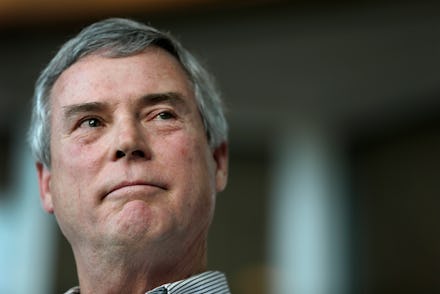You Can Probably Guess How White the U.S.'s Elected Prosecutors Are

So white, according to a new report: An analysis released Tuesday by the Women Donors Network shows that 95% of the folks we've elected to make huge, life-altering decisions for us, including A) who among us gets charged with a felony versus a misdemeanor; B) who gets a plea bargain deal; and even C) how long we stay in prison, are white, often male and, in most cases, both.
In fact, of the 2,437 prosecutors who held elected office last summer, 79% were white men — a demographic that makes up just 31% of the general population, the New York Times reports.
This is not particularly surprising, given the lack of diversity in electoral politics overall. But it does erase any belief that the officials running our criminal justice system actually reflect the people they're throwing in jail by the hundreds of thousands.
Here are some numbers: The United States' incarcerated population reached more than 1.5 million people in 2013, not counting those in immigrant holding centers and juvenile detention facilities. In 1978, that number was less than 300,000, showing a 535% growth in 35 years. Meanwhile, the U.S. population grew 140% over the same period of time.
People of color make up 60% of the nation's incarcerated population, according to the Center for American Progress. And the Bureau of Justice Statistics reported in 2013 that nearly half of all prisoners under state jurisdiction were locked up for nonviolent offenses.
Who's largely responsible for that? Prosecutors.
The WDN report claims that prosecutors may be the American legal system's most powerful actors — even more so than the police. They make their decisions "almost entirely outside of public scrutiny," according to a New Yorker report from May, and WDN found that 85% of the time, they run for office unopposed.
Yet voters often pay little attention to them when filling out your ballot. The result? Three-fifths of U.S. states have zero black prosecutors. In 14, every single elected prosecutor is white. Eighty-three percent are male. This disparity raises questions (and eyebrows) when white male prosectors make troubling decisions around issues that impact people of color and women, like the following:
Robert McCulloch, who helped a grand jury decline to charge Officer Darren Wilson in the August 2014 shooting of unarmed black 18-year-old Michael Brown in Ferguson, Missouri.
Ken Cotter, who decided that Purvi Patel deserved jail time for ending her pregnancy in Indiana earlier this year, making her the first American woman ever locked up for feticide.
Did they make these decisions because they are white and male? Maybe not. Does a more diverse prosecutor pool mean all disparities will magically be erased? No. But at the end of the day, power concentrated in the hands of a homogenous group of decision-makers bears poorly for empathizing with the challenges faced by women and people of color.
And even as police departments have grown more representative over the years, prosecutors have not:
"I think what these numbers dramatize," said Bryan Stevenson, a defense attorney and head of Montgomery, Alabama's Equal Justice Initiative in a call with reporters on Tuesday, "is that the reality is much worse than most people imagine and that we are making almost no progress."